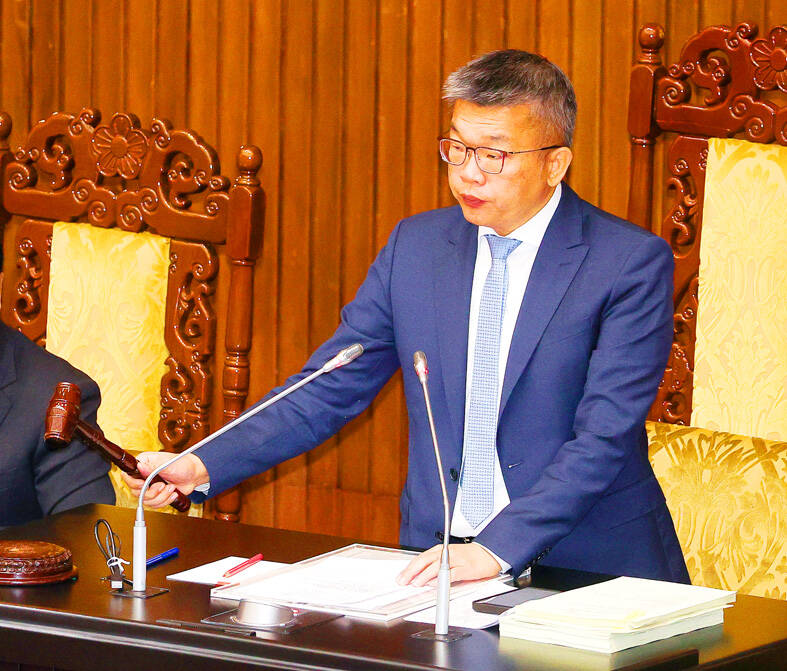The Legislative Yuan yesterday passed amendments adding a penalty of at least seven years in prison for discharging a firearm in public.
The amendments to the Controlling Guns, Ammunition and Knives Act (槍砲彈藥刀械管制條例) state that in addition to jail time, a person who fires a gun in public could be fined up to NT$15 million (US$479,019).
The change, proposed by the Ministry of the Interior, follows police seizures of new kinds of modified guns that have been involved in incidents that resulted in casualties.

Photo:CNA
Prior to the amendments, firing any kind of gun in public was not treated as a criminal offense under the Criminal Code.
A provision in Article 63 of the Social Order Maintenance Act (社會秩序維護法) treated “firing a weapon without justifiable reasons in public” as a crime, but only carried a penalty of no more than three days in prison or a fine up to NT$30,000.
The revised law regulates all types of firearms, ammunition and related equipment to enhance the traceability of nonstandard firearms, the ministry said.
Public use of a nonstandard firearm comes with a jail sentence of five to 12 years and a fine of up to NT$10 million.
Those who manufacture, sell, transport or transfer replica guns could face a sentence of up to seven years in jail and a fine of up to NT$7 million, while those who manufacture, sell or transport parts for replica firearms without approval could be fined NT$1 million to NT$10 million.
If the offense is serious, the seller could be ordered to suspend or terminate their operations, the bill says.
Nonstandard guns are considered firearms that are produced by factories not licensed by the government, and include modified guns.
Replica guns are defined as devices resembling a real firearm in terms of its exterior, structure and materials used to produce it, and could be altered to fire like a real gun.
The amendments also revise a provision stipulating that people who contravene the law, but surrender with all of their firearms, ammunition and knives “may” have their penalties reduced or exempted.
Previously, the Controlling Guns, Ammunition and Knives Act stated that individuals surrendering their firearm “shall” have their penalties reduced or exempted.
Minister of the Interior Lin Yu-chang (林右昌) yesterday said the amendment aimed to curb the circulation of nonstandard weapons, including modified and replica firearms, and stiffen penalties.
About 90 percent of the illegal weapons seized by police this year had been modified, Lin said.

A preclearance service to facilitate entry for people traveling to select airports in Japan would be available from Thursday next week to Feb. 25 at Taiwan Taoyuan International Airport, Taoyuan International Airport Corp (TIAC) said on Tuesday. The service was first made available to Taiwanese travelers throughout the winter vacation of 2024 and during the Lunar New Year holiday. In addition to flights to the Japanese cities of Hakodate, Asahikawa, Akita, Sendai, Niigata, Okayama, Takamatsu, Kumamoto and Kagoshima, the service would be available to travelers to Kobe and Oita. The service can be accessed by passengers of 15 flight routes operated by

GIVE AND TAKE: Blood demand continues to rise each year, while fewer young donors are available due to the nation’s falling birthrate, a doctor said Blood donors can redeem points earned from donations to obtain limited edition Formosan black bear travel mugs, the Kaohsiung Blood Center said yesterday, as it announced a goal of stocking 20,000 units of blood prior to the Lunar New Year. The last month of the lunar year is National Blood Donation Month, when local centers seek to stockpile blood for use during the Lunar New Year holiday. The blood demand in southern Taiwan — including Tainan and Kaohsiung, as well as Chiayi, Pingtung, Penghu and Taitung counties — is about 2,000 units per day, the center said. The donation campaign aims to boost

ENHANCING EFFICIENCY: The apron can accommodate 16 airplanes overnight at Taoyuan airport while work on the third runway continues, the transport minister said A new temporary overnight parking apron at Taiwan Taoyuan International Airport is to start operating on Friday next week to boost operational efficiency while the third runway is being constructed, the Ministry of Transportation and Communications said yesterday. The apron — one of the crucial projects in the construction of the third runway — can accommodate 16 aircraft overnight at the nation’s largest international airport, Minister of Transportation and Communications Chen Shih-kai (陳世凱) told reporters while inspecting the new facility yesterday morning. Aside from providing the airport operator with greater flexibility in aircraft parking during the third runway construction,

American climber Alex Honnold is to attempt a free climb of Taipei 101 today at 9am, with traffic closures around the skyscraper. To accommodate the climb attempt and filming, the Taipei Department of Transportation said traffic controls would be enforced around the Taipei 101 area. If weather conditions delay the climb, the restrictions would be pushed back to tomorrow. Traffic controls would be in place today from 7am to 11am around the Taipei 101 area, the department said. Songzhi Road would be fully closed in both directions between Songlian Road and Xinyi Road Sec 5, it said, adding that bidirectional traffic controls would